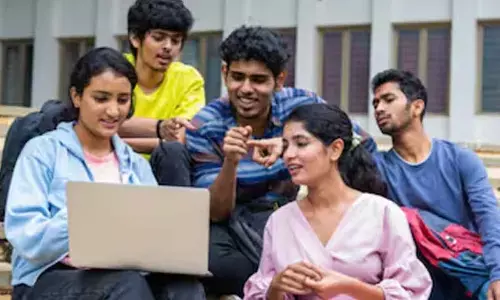Foreign students come to India to learn English

From Indian bureaucrats to executives from as many as 87 countries around the world, when it comes to gaining proficiency in English, it is not England they go to but India.
Hyderabad: From Indian bureaucrats to executives from as many as 87 countries around the world, when it comes to gaining proficiency in English, it is not England they go to but India.
Indian defence personnel to Indian Foreign Service (IFS) probationers, corporate executives and government officials from non-English speaking countries, they all look to English and Foreign Languages University (EFLU) to learn or hone their language skills. The unique university caters to ministers, bureaucrats, doctors, engineers and others from different parts of the world not just graduate and post-graduate courses in English but also 11 foreign languages.
.jpg)
"Every year about 400 executives from the countries right from Bhutan to Brazil come here for English proficiency under ITEC (Indian Technical and Economic Cooperation) programme," EFLU Vice-Chancellor Sunaina Singh said.
"These are extension services apart from regular courses. We are completely nationalistic in our approach. As Indian experts on English, we train foreign citizens who come to us. They don't just learn English but also learn culture and go back as ambassadors of India," she said.
Under a new initiative, EFLU through the Ministry of External Affairs established Centres for English Language Training (CELTs) in Sri Lanka and ASEAN countries like Laos, Myanmar, Cambodia and Vietnam.
"We are going to set up soon more such centres in five African countries - Sudan, Djibouti, Central Asian Republic, Togo and Mauritania," she said.
The university engaged in research, training and teaching English language, foreign languages and their literatures, linguistics, interdisciplinary and cultural studies is uniquely placed at national and international levels.Only one of its kind in South Asia, it has its main campus here while two campuses are located at Lucknow and Shillong.
Students from neighbouring countries come here through the Indian Council for Cultural Relations (ICCR). EFLU offers a range of short-term, self-financed and need-based vocational courses in addition to MA, PhD programmes for on-campus students and also diploma and distance courses.
Its foreign languages courses, both regular and diploma or certificate courses, are in great demand from engineers, executives and others seeking proficiency in these languages. EFLU is the only university after Jawaharlal Nehru University (JNU) to teach maximum number of foreign languages.
The specialised university has an inter-disciplinary school, which teaches philosophy and culture and has a Hindi department and also Sanskrit. "We do slightly other things than just teaching language. We do languages and we do their cultures because languages are born out of cultures," said the VC, who earlier headed the department of English at Osmania University.
Under EFLU's cafeteria model, students enrolling for MA programmes in English can pick and choose the courses they want.
A brainchild of India's first Prime Minister Jawaharlal Nehru, it was born in 1958 as Central Institute of English (CIE) to train Indians in teaching of English. It became Central Institute of English and Foreign Languages (CIEFL) in 1972 when foreign languages were added.
Growing beyond just a training institute, CIEFL in 2000 began to offer MA programmes in English literature, English language teaching, cultural studies, linguistics and phonetics, and media and communication.
EFLU has linkages with 22 universities, most of them European and some American. They have student and faculty exchange programmes. "We are trying to do some joint courses and joint research programmes and work on new areas."
The university today has 2,500 on-campus students while there are 1,500 more under distance and other programmes. As the number of students increased by four times after EFLU became a central university, the biggest challenge faced by the VC is to augment the infrastructure.
Taking over the reins when the university was beset with problems like corruption, politics and caste factor, she claims to have turned around the institution by enforcing discipline and ensuring accountability and transparency.

















